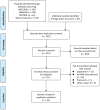Immune checkpoint inhibitors in advanced or metastatic mucosal melanoma: a systematic review
- PMID: 32489431
- PMCID: PMC7238311
- DOI: 10.1177/1758835920922028
Immune checkpoint inhibitors in advanced or metastatic mucosal melanoma: a systematic review
Abstract
Background: Conventional cytotoxic chemotherapy offers minor benefit to patients with mucosal melanoma (MM). Although immune checkpoint inhibitors (ICIs) have become the preferred approach in patients with advanced or metastatic cutaneous melanoma, the evidence of their clinical use for MM is still limited. This systematic review aims to summarize the efficacy and safety of ICIs in advanced or metastatic MM.
Methods: We searched electronic databases, conference abstracts, clinical trial registers and reference lists for relevant studies. The primary outcomes included the overall response rate (ORR), median progression-free survival (PFS), median overall survival (OS), one-year PFS rate, and one-year OS rate.
Results: This review identified 13 studies assessing anti-CTLA-4 monotherapy, 22 studies assessing anti-PD-1 monotherapy, two studies assessing anti-CTLA-4 and anti-PD-1 combination therapy, one study assessing anti-PD-1 antibodies combined with axitinib, and three studies assessing anti-PD-1 antibodies combined with radiotherapy. For most patients who received ipilimumab monotherapy, the ORR ranged from 0% to 17%, the median PFS was less than 5 months, and the median OS was less than 10 months. For patients who received nivolumab or pembrolizumab monotherapy, most studies showed an ORR of more than 15% and a median OS of more than 11 months. The combined administration of anti-CTLA-4 and anti-PD-1 agents showed benefits over single-agent therapy with an ORR of more than 33.3%. In a phase Ib trial of toripalimab in combination with axitinib, approximately half of patients had complete or partial responses. Three retrospective studies that investigated anti-PD-1 antibodies combined with radiotherapy showed an ORR of more than 50%, which was higher than each single modality treatment.
Conclusions: Immune checkpoint inhibitors, especially anti-PD-1 monoclonal antibodies alone and in combination with anti-CTLA-4 monoclonal antibodies or other modalities, are promising treatment options for advanced or metastatic MM. However, high-level evidence is still needed to support the clinical application.
Keywords: CTLA-4; PD-1; immune checkpoint inhibitor; mucosal melanoma; radiotherapy.
© The Author(s), 2020.
Conflict of interest statement
Conflict of interest: The authors declare that there is no conflict of interest.
Figures


References
-
- Bishop KD, Olszewski AJ. Epidemiology and survival outcomes of ocular and mucosal melanomas: a population-based analysis. Int J Cancer 2014; 134: 2961–2971. - PubMed
-
- Carvajal RD, Spencer SA, Lydiatt W. Mucosal melanoma: a clinically and biologically unique disease entity. J Natl Compr Canc Netw 2012; 10: 345–356. - PubMed
-
- Lee SP, Shimizu KT, Tran LM, et al. Mucosal melanoma of the head and neck: the impact of local control on survival. Laryngoscope 1994; 104: 121–126. - PubMed
Publication types
LinkOut - more resources
Full Text Sources

